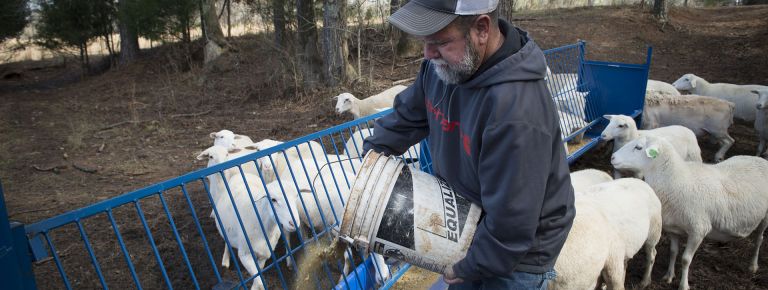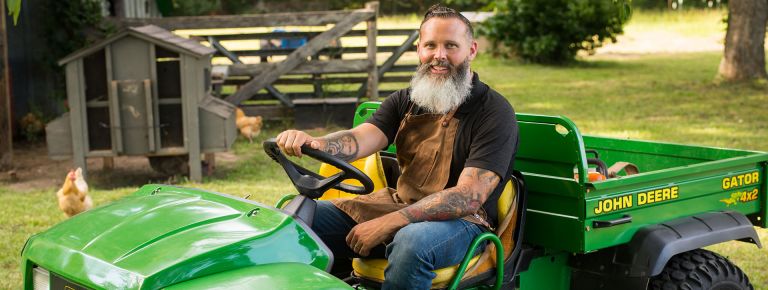Back home on the farm
The Institute on Human Development and Disability began assisting Georgia agricultural workers in 2005 through a project called FarmAgain, which focuses on farmers who have chronic health conditions and/or disabilities.
“Through worksite accommodations, assistive technology, mentoring and training, our goal is to aid the farmer to be as successful as possible,” said Rebecca Brightwell, co-director of the FarmAgain project with Glen Rains from the UGA College of Agricultural and Environmental Sciences.
FarmAgain provides services at no cost to the farmer.
Staff meet with the farmer and provide an in-depth assessment that looks at both worksite modifications and technology to make tasks easier. Each solution is personalized to the needs of the farmer.
“Our farmers are inventive and resourceful,” Brightwell said. “They are accustomed to fixing and fabricating items to keep their farm machinery going. After an injury they are quick to look for a solution to get them productive again. Our goal is to work closely with the farmer to come up with safe solutions.”
Making a difference
Danny Sims of LaGrange was born with spina bifida.
He grew up on his family farm, Sims Pond Farms, and has been involved in farming his entire life, primarily raising sheep and pigs.
“He’s never allowed his disability to hold him back and wanted assistance to be even more independent on the farm,” Brightwell said.
Sims reached out to FarmAgain for services. Through one of the FarmAgain programs, AgrAbility, several pieces of assistive technology were identified that would be helpful.
The project also assisted Sims in applying for services through the Georgia Vocational Rehabilitation Agency, which was instrumental in purchasing much of the equipment Sims needed.
One area Sims needed assistance was feeding his animals.
Due to his disability, Sims has limited use of his hands. He would use his teeth to pick up 50-pound bags of feed, then transfer the feed to buckets to feed the animals.
“I would go to the feed store and pick up 160 bags of feed each month and would have to unload them with my teeth,” Sims said. “I would have to go about 120 feet with each bag.”
Mason Dean, FarmAgain’s field coordinator, identified several solutions. First was a feed trailer that can be connected to a pickup truck for transport. Sims takes the trailer to the feed store and they fill it with the two tons of feed.
Now, Sims can empty the feed directly into the buckets without having to lift and transport individual bags. Dean also identified fence-line feeders to feed animals on the outside of the fence.
“The assistive technology and work site accommodations have made Danny’s jobs on the farm much safer and less strenuous on his body,” Dean said. “Overall he is able to run his farm more efficiently.”

Danny Sims of LaGrange received help from IHDD’s Farm Again program. Photo by Robin Rayne Nelson
Assisting veterans
FarmAgain also has seen a recent influx of military veterans with disabilities reaching out for assistance.
Each year nearly 200,000 servicemen and women separate from active duty in the U.S. military, and many find careers in agriculture, Brightwell said.
“There are many great fits between farming culture and military culture,” Brightwell said. “Veterans want to be of service, they are used to hard work, they can adapt to changing circumstances quickly and are looking for ways to reconnect to society. Watching crops grow and raising animals can also be very healing.”
The Veterans Administration reports that 22 percent of veterans have a disability.
Through a pilot study, Brightwell found the number of veterans with disabilities entering into agriculture may be significantly higher. During a recent series of produce food safety workshops aimed at veterans, 77 percent of the participants reported having disabilities and mental health issues.
“The primary conditions reported were hearing loss, post-traumatic stress disorder, anxiety, depression and physical injuries,” Brightwell said.
Some of FarmAgain’s projects are geared to new farmers with disabilities such as AgStart and the Farm Boot Camp, which provide mentoring and customized trainings.
Jon Waldorf, an Army veteran and owner of Simple Soul Farms in Tignall, received assistance starting his new farm. Waldorf experiences service-related PTSD.
IHDD Extension Educator Kyle Haney assisted Waldorf with everything from branding services such as logo and website development to applying for services through the Farm Service Agency and Natural Resources Conservation Service to filing to become an LLC.
“I would have had no idea on how to connect all of these resources,” Waldorf said. “It was extremely beneficial as I was getting started.”
FarmAgain includes the following projects: AgrAbility, Farm Boot Camp, Veteran Produce Food Safety Training and AgStart.
To learn more visit www.farmagain.com.

